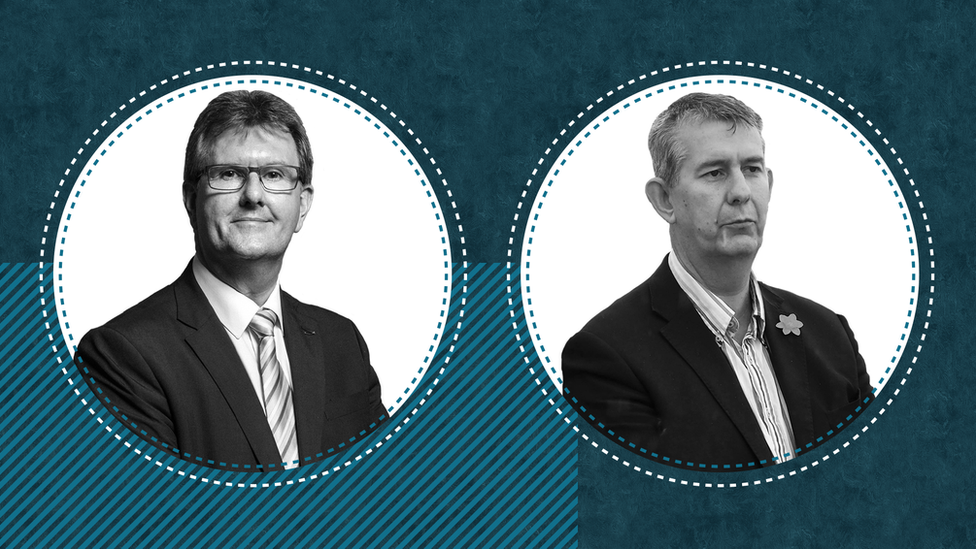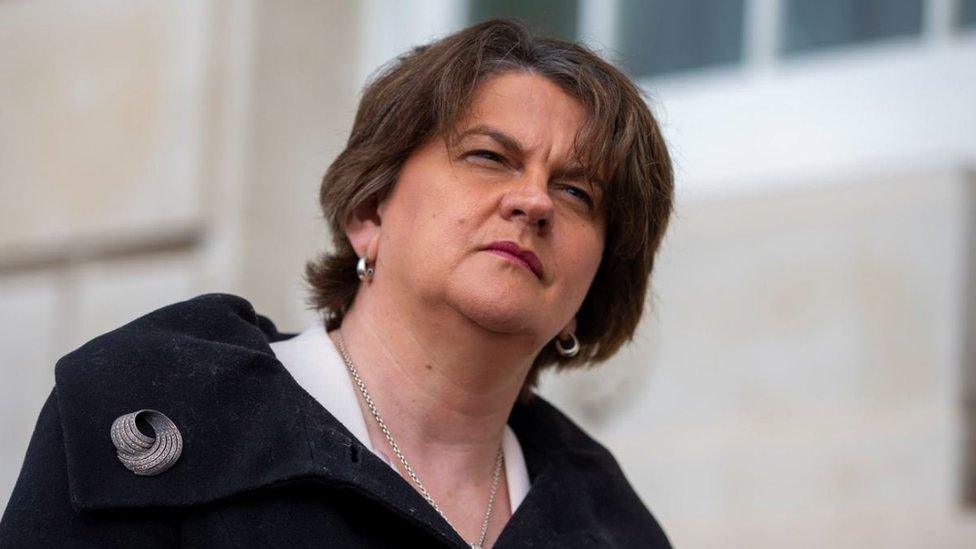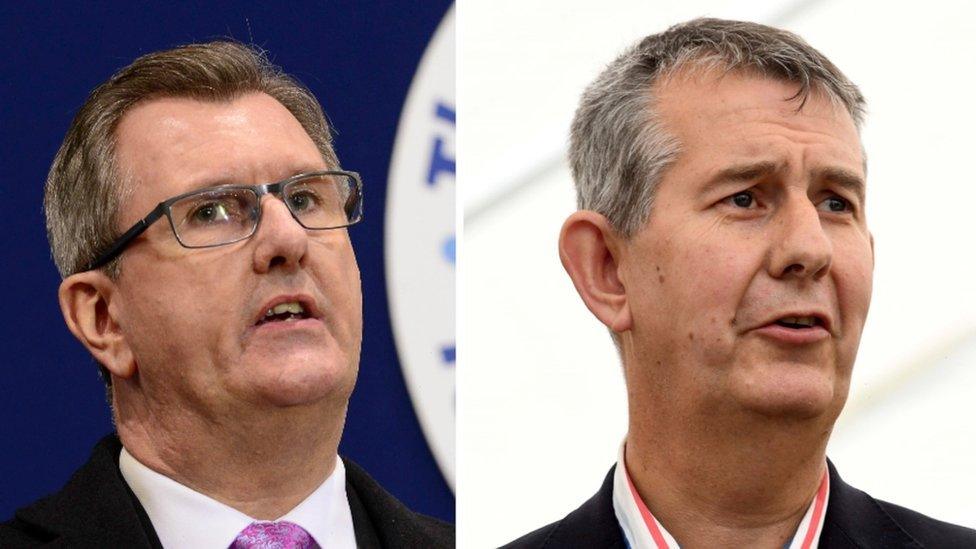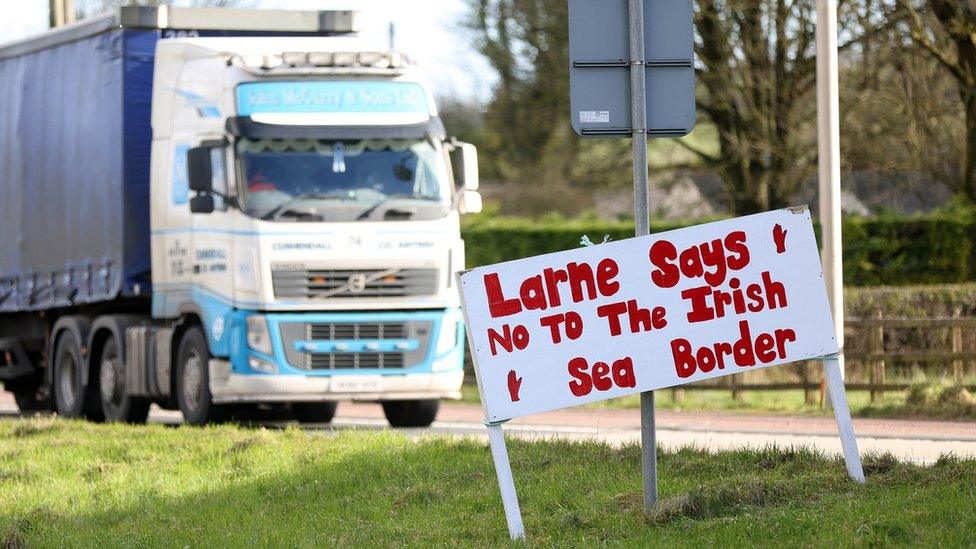DUP leadership race: All you need to know about the contest
- Published

Two political stalwarts - Edwin Poots and Sir Jeffrey Donaldson - are both vying to become the next leader of the Democratic Unionist Party (DUP).
There has never before been a leadership contest in the DUP's 50-year history, with predecessors having been chosen by the party's top ranks.
BBC News NI explains why the race is taking place and how it will work.
Why is the party electing a new leader?
The current leader Arlene Foster has been forced to stand down after a majority of DUP assembly members (MLAs) and MPs signed a letter of no confidence in her.
She has been party leader since November 2015 and, as the leader of the largest political party in Northern Ireland, then took over as first minister of the Stormont executive in January 2016.
Growing internal dissatisfaction with her leadership over the Irish Sea border and concerns about a poor result in the 2022 assembly election were among issues that brought the matter to a head.
Mrs Foster has said she will resign as party leader on 28 May and step down as first minister at the end of June, to provide a transition period for her successor.
A new deputy leader will also be elected, after incumbent Lord Dodds announced on Tuesday evening that he would not bid to retain the role.
So who are the contenders for DUP leader?
Edwin Poots is Stormont's agriculture and environment minister in the power-sharing executive and was first to declare his candidacy last Thursday.
He became an MLA for the Lagan Valley constituency in 1998 and had previously served on Lisburn City Council.
He has served as minister for the environment, minister for arts, culture and leisure and as health minister over the course of his political career.
However he is facing stiff competition for the leadership from Sir Jeffrey Donaldson, who has been the MP for Lagan Valley since 1997.
At that time he was an Ulster Unionist Party (UUP) member but was one of several politicians who defected to the DUP in 2004 after a dispute over the Good Friday Agreement peace deal.
Sir Jeffrey announced on Monday that he would enter the race.
The two men not only represent the constituency of Lagan Valley but also work out of the same office building.
Why is the leadership election unprecedented?
There are two reasons.
Firstly, there has never been a formal contest to elect a DUP leader before.
Only three people have occupied the role of party leader in its 50-year history: founder Ian Paisley, Peter Robinson and Arlene Foster.
Both Mr Robinson and Mrs Foster were effectively anointed to the top job, rather than being elected as leader.
The fact that there are now two candidates seeking to replace Mrs Foster demonstrates that there is a clear split within the DUP about the future political direction it should take in a bid to rebuild support internally and with grassroots unionist voters.

Secondly, whoever wins the leadership is unlikely, for the first time, to also take up the position of first minister at Stormont.
Mr Poots has already signalled that he will split the roles and appoint someone else as he intends to remain as agriculture minister.
Party rules state that the first minister should also be an MLA.
That means Sir Jeffrey would either have to appoint someone else as first minister or step down as an MP and be co-opted into the assembly as an MLA if he wished to become first minister as well.
Who gets to determine the outcome of the race?
Only those elected to the House of Commons and the Northern Ireland Assembly get to vote in a leadership election, according to party rules.
There are 28 MLAs - including Mrs Foster - and eight MPs, who make up the electoral college.
In order to become party leader, the winning candidate must secure the support of at least 19 of the party's MLAs and MPs.
Some DUP politicians have already openly given their backing to one candidate or the other, with MLAs Paul Givan, Mervyn Storey and Paul Frew among those declaring support for Mr Poots.
On Saturday, Mr Frew - the campaign manager for Mr Poots - claimed they had received a majority of endorsements needed to win.
But that was heavily disputed by sources within Sir Jeffrey's campaign team, who insisted support they had received within the party so far was "more than encouraging".
MPs including Gavin Robinson and Jim Shannon, as well as Stormont's Education Minister Peter Weir, have said they will vote for Sir Jeffrey.
When will the election take place?
Party officers - who set DUP policy and oversee internal matters - met on Tuesday and agreed that the election will happen by secret ballot on Friday 14 May at 11:00 BST, with the result expected by 17:00.
Officers said they had chosen 14 May as the date, in light of executive business regarding the next review of coronavirus restrictions on Thursday, and so DUP MPs can attend Parliament on Wednesday for the Queen's Speech.
The party said contenders for both leader and deputy leader must submit their expression of interest by 17:00 BST on 6 May.
Each nominated candidate for leader of the party will be given 10 minutes to speak to the online meeting and each candidate for deputy leader will be given five minutes to speak, before the vote will take place.
The result must then be ratified by the DUP's executive committee, which is made up of MLAs, MPs, peers, as well as five representatives from constituency associations and delegates from the party's university and youth organisations.
Ultimately, a lot of the process remains in the gift of party officers and the executive committee as there is no history, nor experience of handling such a contest.
But we should soon know who will take up the next mantle of DUP leader and their deputy at a time when unionism appears to be at a crossroads like never before.
- Published4 May 2021

- Published28 April 2021
